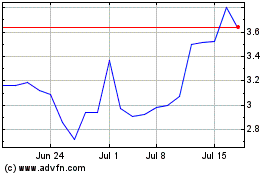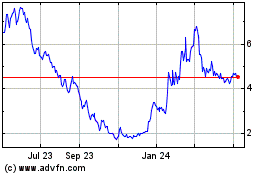Tenaya Therapeutics Publishes Preclinical Data in Science Translational Medicine Detailing Discovery of HDAC6 Inhibitor for Treatment of Heart Failure
July 06 2022 - 2:00PM

Tenaya Therapeutics, Inc. (NASDAQ: TNYA), a biotechnology company
with a mission to discover, develop and deliver curative therapies
that address the underlying causes of heart disease, announced the
publication of preclinical research in the July 6 issue of Science
Translational Medicine. The article, titled “Phenotypic screening
with deep learning identifies HDAC6 inhibitors as cardioprotective
in a BAG3 mouse model of dilated cardiomyopathy,” describes the
discovery of histone deacetylase 6 (HDAC6) as a promising
therapeutic target. These insights led to the development of the
company’s lead small molecule candidate, TN-301, a highly selective
HDAC6 inhibitor initially being developed for the potential
treatment of heart failure with preserved ejection fraction
(HFpEF).
"While cardiovascular diseases remain the leading cause of death
worldwide, innovation in therapeutic discovery has suffered from
the challenge of identifying targets with validation in human
tissue that can address underlying mechanisms of heart disease. The
success of our approach using disease models based on human cells
plus machine learning algorithms to discover promising new
therapeutic targets for heart diseases provides reason to believe
that this methodology may be broadly applicable to accelerating
target and drug discovery of other disease-modifying therapies,”
said Timothy Hoey, Ph.D., Chief Scientific Officer of Tenaya
Therapeutics. “Research presented in this paper highlight the
exquisite target selectivity and cardioprotective qualities of our
HDAC6 inhibitors. We look forward to advancing TN-301, the first
product candidate in our pipeline to be discovered and validated
using this approach, into clinical studies.”
Key Research FindingsThe publication in Science
Translational Medicine details Tenaya’s distinct Precision Medicine
platform approach of applying phenotypic screening and deep
learning to human induced pluripotent stem cell-derived
cardiomyocyte (iPSC-CM) disease models. Tenaya developed and
validated a BAG3 knock-down human iPSC-CM model of dilated
cardiomyopathy (DCM), a genetic cardiomyopathy that can lead to
enlargement of the heart and heart failure in humans, for target
identification and screening of novel cardiovascular disease
candidates. In the BAG3-deficient human iPSC-CM models, HDAC6
inhibition was shown to protect against damage of the sarcomere,
one of the basic building blocks of heart muscle present in all
cardiomyocyte cells. Tenaya then developed a series of novel HDAC6
inhibitors through medicinal chemistry efforts that includes
TYA-018 and TN-301, which are structurally and functionally
similar. TYA-018 is used in Tenaya’s preclinical in vitro and in
vivo studies of HDAC6 inhibition, while TN-301 is being advanced
into clinical studies.
To further validate the potential of HDAC6 inhibition, Tenaya
translated its initial in vitro findings to a BAG3 cardiomyocyte
knockout mouse model of DCM. BAG3 loss-of-function mutations have
been linked to DCM and, in preclinical animal models, result in a
steady loss of heart function leading to death from heart failure
that simulates the progressive decline observed in human disease,
providing a relevant model by which to study the results of
targeted intervention.
When evaluated in a BAG3 knock-out mouse model of DCM, HDAC6
inhibition with TYA-018:
- Demonstrated exquisitely selective enzyme inhibition, with
greater than 2500-fold preference for HDAC6 over other members of
the HDAC family
- Reduced sarcomeric damage, improved heart dilation, and
conferred protection of left ventricular function from rapidly
progressive decline.
- Enhanced cardiac energetics, mitochondrial membrane potential
and reserve respiratory capacity, which contribute to maintaining
improved heart function.
Studying the mechanism of action of HDAC6 inhibition in these in
vitro and in vivo DCM models provided additional insights that
subsequently led to the discovery that HDAC6 inhibition may be
highly effective in the setting of HFpEF with a multi-model
mechanism of action. Based on extensive preclinical evaluation,
Tenaya will seek to initially develop TN-301 for the potential
treatment of HFpEF. Tenaya is on track to submit an Investigational
New Drug (IND) application to the U.S. Food and Drug Administration
(FDA) in the second half of 2022.
About TN-301 and HFpEFTN-301 is a highly
specific small molecule HDAC6 inhibitor initially being developed
for the potential treatment of HFpEF. HFpEF accounts for
approximately 50% of all heart failures, yet there are few proven
treatment options. This disease involves systemic inflammation,
left ventricular hypertrophy, fibrosis, and diastolic dysfunction
resulting in high morbidity and mortality in affected individuals.
In preclinical studies, TN-301 has been shown to have a multi-modal
mechanism of action and to reverse many of the signs and symptoms
of HFpEF in multiple relevant models, with evidence of reduced
inflammation and fibrosis, overall improvement in metabolism, and
improvements in left ventricular function and diastolic filling and
pressures. Tenaya plans to submit an IND application to study
TN-301 in human clinical studies to the FDA in the second half of
2022.
About Tenaya’s Precision Medicine
PlatformTenaya’s Precision Medicine platform uses human
iPSC-CMs as proprietary disease models combined with analysis of
human genetics and the use of machine learning algorithms for the
identification of new targets, validation of known targets, and
high-throughput screening for drug discovery. This platform is
intended to overcome the shortcomings of traditional drug
development efforts that rely more heavily on insights from animal
models to identify targets and to develop therapies intended for
human heart disease. This platform has potentially broad utility
for the identification of targets and therapies in a
modality-agnostic manner — including gene therapy, small molecules,
and biologics — for both genetic and non-genetic forms of heart
disease.
About Tenaya TherapeuticsTenaya Therapeutics is
a biotechnology company committed to a bold mission: to discover,
develop and deliver curative therapies that address the underlying
drivers of heart disease. Founded by leading cardiovascular
scientists from Gladstone Institutes and the University of Texas
Southwestern Medical Center, Tenaya is developing therapies for
rare genetic cardiovascular disorders, as well as for more
prevalent heart conditions, through three distinct but interrelated
product platforms: Gene Therapy, Cellular Regeneration and
Precision Medicine. For more information, visit
www.tenayatherapeutics.com.
Forward Looking StatementsThis press release
contains forward-looking statements as that term is defined in
Section 27A of the Securities Act of 1933 and Section 21E of the
Securities Exchange Act of 1934. Statements in this press release
that are not purely historical are forward-looking statements.
Words such as “look forward,” “believe,” “will,” “potential” and
similar expressions are intended to identify forward-looking
statements. Such forward-looking statements include, among other
things, Tenaya’s clinical development plans for TN-301; the
therapeutic potential of TN-301 as a treatment for HFpEF;
expectations regarding the timing of the IND filing for TN-301 and
the broad potential of Tenaya’s precision medicine platform for the
identification of targets and therapies. The forward-looking
statements contained herein are based upon Tenaya’s current
expectations and involve assumptions that may never materialize or
may prove to be incorrect. These forward-looking statements are
neither promises nor guarantees and are subject to a variety of
risks and uncertainties, including but not limited to: the timing,
scope and likelihood of regulatory filings and approvals; the
timing, progress and results of clinical studies for TN-301; the
potential for any clinical trial results to differ from
preclinical, interim, preliminary, topline or expected results;
risks associated with the process of discovering, developing and
commercializing drugs that are safe and effective for use as human
therapeutics and operating as an early stage company; Tenaya’s
ability to develop, initiate or complete preclinical studies and
clinical trials, and obtain approvals, for any of its product
candidates; Tenaya’s ability to raise any additional funding it
will need to continue to pursue its business and product
development plans; negative impacts of the COVID-19 pandemic on
Tenaya’s manufacturing and operations, including preclinical
studies and planned clinical trials; Tenaya’s reliance on third
parties; Tenaya’s commercialization and marketing capabilities and
strategy; the loss of key scientific or management personnel;
competition in the industry in which Tenaya operates; Tenaya’s
ability to obtain and maintain intellectual property protection for
its product candidates; general economic and market conditions; and
other risks. Information regarding the foregoing and additional
risks may be found in the section entitled “Risk Factors” in
documents that Tenaya files from time to time with the Securities
and Exchange Commission. These forward-looking statements are made
as of the date of this press release, and Tenaya assumes no
obligation to update or revise any forward-looking statements,
whether as a result of new information, future events or otherwise,
except as required by law.
ContactsInvestors Michelle
CorralVice President, Investor Relationship and Corporate
CommunicationsTenaya TherapeuticsIR@tenayathera.com
Media Wendy RyanTen Bridge
CommunicationsWendy@tenbridgecommunications.com
Tenaya Therapeutics (NASDAQ:TNYA)
Historical Stock Chart
From Mar 2024 to Apr 2024

Tenaya Therapeutics (NASDAQ:TNYA)
Historical Stock Chart
From Apr 2023 to Apr 2024
